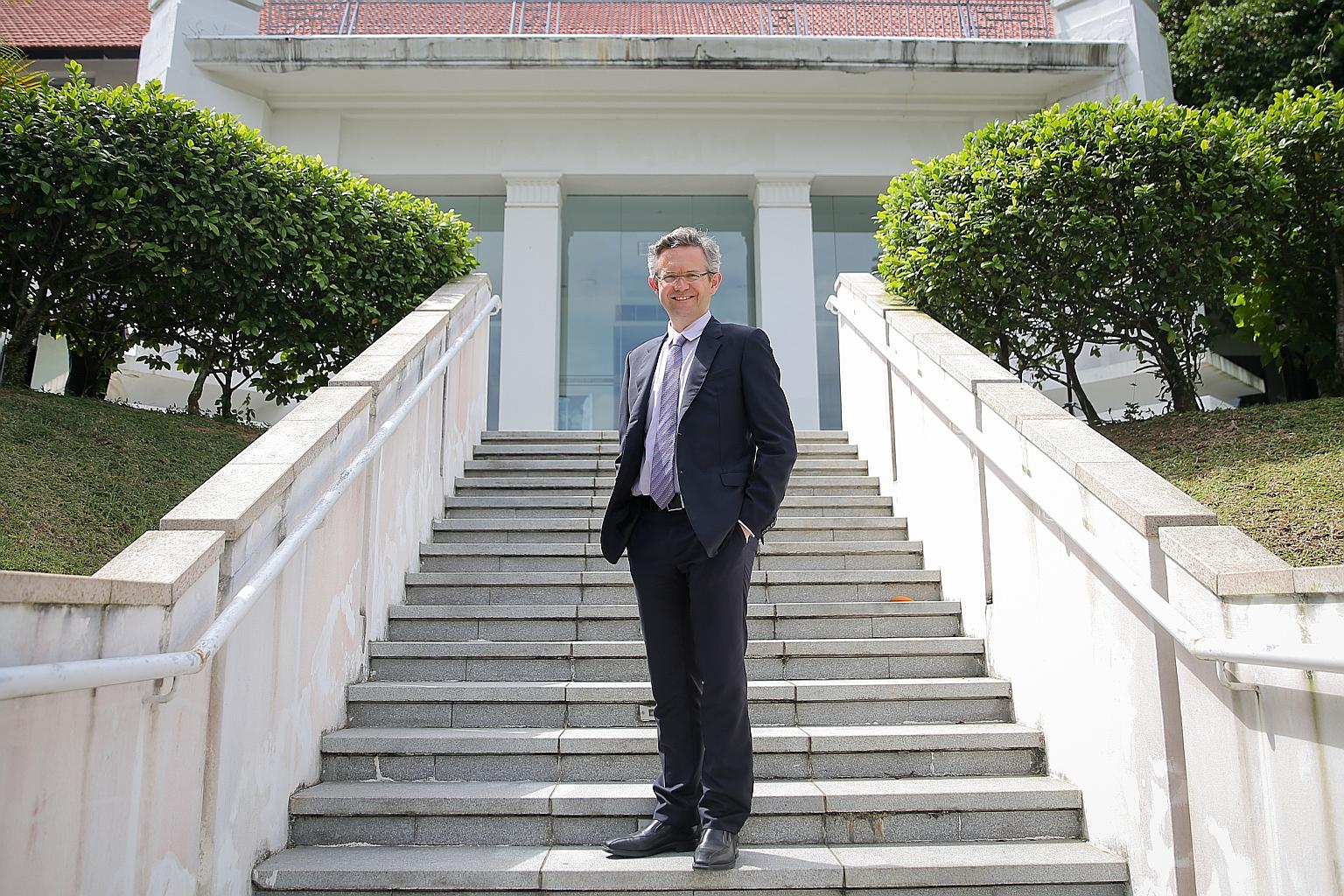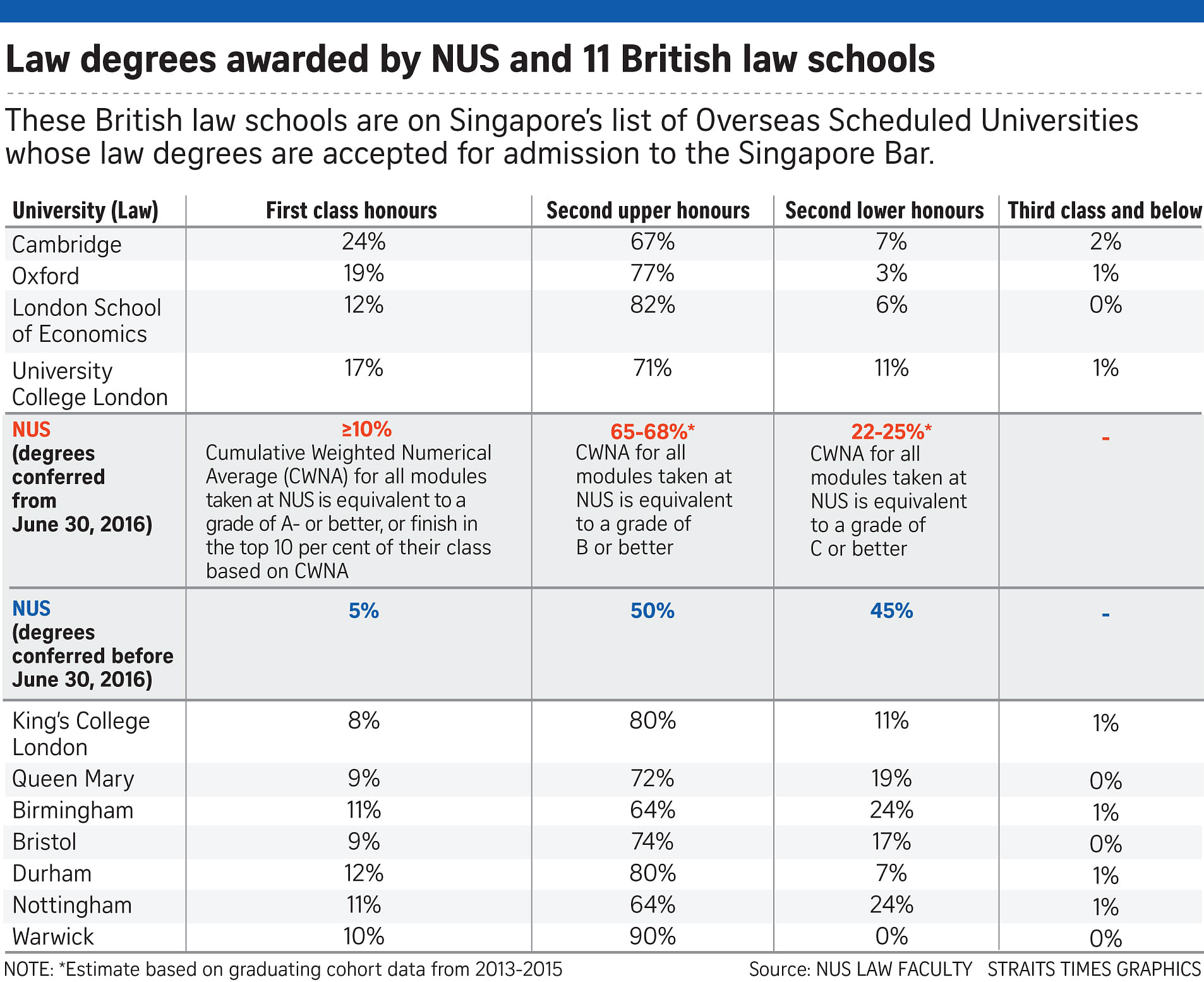More students can earn first class honours from NUS Law
Industry players and students cheer landmark policy revision that will start with cohort graduating in June
Sign up now: Get tips on how to help your child succeed

NUS Law Faculty dean Simon Chesterman said in a letter to students that "in view of the high quality of our students, NUS finds it timely to bring its honours awards closer to its peers".
ST PHOTO: ONG WEE JIN
The National University of Singapore (NUS) Law school is doubling the number of students eligible for the first class honours degree to the top 10 per cent of each cohort, up from 5 per cent, in a move hailed by industry players and students alike.
The landmark policy revision, the first in a decade, will start with students graduating in June this year.
The review will also see more students awarded the second class (upper division) honours degree, expected to be the top 65 per cent to 68 per cent of each cohort, up from the current 50 per cent.
With the latest revision, in a cohort of 240 students, for example, up to 24 could be awarded first class honours while the next 156 students at 65 per cent could attain the second class (upper division) honours degree.
NUS Law Faculty dean Simon Chesterman said in a letter to the students yesterday that the honours policy revision will bring NUS closer to comparable universities in Britain and Australia.
He wrote: "Other top law schools with a comparable cohort size, such as Oxford, London School of Economics and University College London, are awarding first class honours in the range of 12 per cent to 24 per cent, and second class (upper division) honours degree in the range of 67 per cent to 82 per cent.

"In view of the high quality of our students, NUS finds it timely to bring its honours awards closer to its peers."
-
Some big names with NUS Law first class honours
TOMMY KOH (CLASS OF 1961) Ambassador-at-Large, Ministry of Foreign Affairs, chairman of the Institute of Policy Studies, and of National Heritage Board
TAN LEE MENG (CLASS OF 1972) Senior Judge, former deputy vice-chancellor and dean of the Faculty of Law, NUS
ANDREW PHANG BOON LEONG (CLASS OF 1982) Judge of Appeal, Supreme Court of Singapore
K. SHANMUGAM (CLASS OF 1984) Minister for Home Affairs and Minister for Law
SUNDARESH MENON (CLASS OF 1986) Chief Justice
AEDIT ABDULLAH (CLASS OF 1994) Judicial Commissioner, Supreme Court of Singapore
KOH SWEE YEN (CLASS OF 2004) Partner, WongPartnership
The NUS system differs from that at Singapore Management University (SMU), where students, including those studying law, graduate with distinctions based on a cumulative grade point average (GPA). Those with a GPA of 3.8 and above get the highest distinction, summa cum laude.
"As long as a student achieves a given GPA, he/she gets the class of award accordingly. This essentially means that standards are generally maintained over time and do not vary with the quality of students in that cohort," said director of SMU's office of registrar Tan Lee Chuan.
Yesterday, past and present NUS Law students cheered the changes.
Drew & Napier trainee lawyer Benjamin Foo, 26, who graduated last year with first class honours, said: "During my time, I knew of many deserving students who fell just short of being in the top 5 per cent."
Fourth-year law student Hairul Hakkim, 25, who has been on the Dean's List every year, said he and his peers welcomed the move to give "deserved recognition to students who have worked hard for it".
Also welcoming the changes, second-year law student Rachel Tan, 27, said the increase should not be seen as a "dilution of the class of honours as NUS will still award a lower proportion of first and second upper class honours degrees compared with other universities".
Professor Chesterman told The Straits Times: "The quality of the students coming in is so good that we think it is unfair to say to almost half of them - 'you are going to graduate with a lower second honours' - which makes them look like they didn't work as hard as their peers when it is just a function of mathematics."
He said the changes recognised the students' quality and the work they did but stressed the university does not guarantee anyone a grade.
He added: "If you get an average grade of A minus or higher across all of your degree modules, or if you are in the top 10 per cent, then you get first class honours. If you get a B average or above and you are not in the first class honours, then you are in the upper second."
The increase, however, was still seen by some people as "still too small and still not enough", he said.
"The market suggests that we are too stingy... I think it is important that people understand that we will still be giving far fewer first class honours than our peer institutions," said Prof Chesterman.
TSMP Law's joint managing director Stephanie Yuen Thio said: "As an employer, we have hired first class honours (graduates) from foreign universities who do not hold a candle to some of the second uppers from Singapore universities. It's time to level the playing field."
Law Society president Thio Shen Yi said that while the industry "already considers NUS and SMU degrees very favourably, this moves the dial a little more in their favour".


